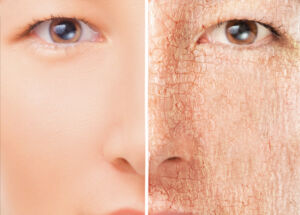Dry, flaky skin can be quite an alarming problem that often worsens during winter, when the skin is exposed to the dehydrating effects of cold weather and central heating systems.Dry Skin
What is dry skin?
Dry skin, also known as xerosis, is a condition characterized by rough, scaly skin that may also be inflamed, irritated, painful, and develop cracks. The condition can affect people of any age.Dry Skin
Causes of dry skin
Dry air is considered the most common cause of dry skin, but it may also be due to age-related changes to the skin, or the presence of a skin disease such as dermatitis.Dry Skin
The skin gets drier with age, and this makes it less elastic and prone to cracking and flaking. In some cases dry skin may be due to dermatitis, which is an inflammatory skin condition marked by dry patches on various parts of the body.Dry Skin
How to treat dry skin
In order to fight back effectively against dry skin, a careful examination must be done by a dermatologist, to identify the underlying cause. Doctors often recommend a combination of medications and lifestyle changes, to banish dry skin.Dry Skin
Extremely dry skin is treated with the use of topical steroids that help to reduce itching, swelling, and redness.Dry Skin
The following is also recommended:Dry Skin
- Using a daily moisturizer, which should applied within 5 minutes of getting out of the shower. Ensuring that the skin properly moisturized is one of the most effective ways to keep it smooth and healthy. A non-alcoholic moisturizer is the best choice.
- Avoiding soaps and body washes with harsh ingredients, as these rob the skin of moisture.
- Keeping showers short, in order to reduce the loss of natural oils from the skin.
Easy Treatments for Dry and Flaky Skin
Though the following treatments are numbered, they are in no particular order. I encourage you to scroll through and see which ones appeal to you.
1. Stay Hydrated
Hydration is the key to preventing skin dryness. Drinking lots of water every day—about eight glasses—goes a long way in replenishing the skin’s moisture level. Eating fruits and vegetables is also a great way of staying hydrated.
2. Avoid Washing Your Face With Hot Water
Experts say that it is best to wash your face with warm water. This is a notch warmer than lukewarm and is best for relaxing the pores of the skin without drying it out. It also makes cleaning the face easier. Whereas warm water is quite gentle, hot water is a natural exfoliator. If one has dry skin, hot water is an enemy that may cause aggravation, especially on the forehead. Keep in mind that this includes baths and showers!
3. Use a Mild Cleanser
Using a mild facial cleanser may also help in maintaining the skin’s water content, but only if you find the right one. Avoid perfumed cleansers with alcohol and sodium lauryl sulfate (a synthetic organic compound that dries up the skin’s moisture), and opt for fragrance-free cleansers with ceramides. Fragrance-free cleansers are better than perfumed ones because the latter commonly contains alcohol, which quickly dehydrates the skin. Ceramides lock in moisture and keep skin soft and hydrated


